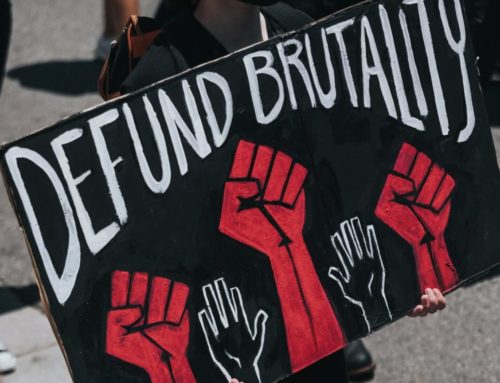The Center for Popular Democracy
The killing of unarmed teenager, Michael Brown, by Ferguson police officer Darren Wilson created a moment of moral outrage and mobilization that reverberated around the country. Unfortunately, we understand that the harassment and killing of black and brown women and men through excessive use of force by law enforcement is not uncommon in the United States. According to a report by the Malcolm X Grassroots Project, in 2012 an average of one black person was killed by law enforcement or vigilantes every 28 hours. For the families and individuals harmed by law enforcement justice and accountability are often elusive or non-existent. The prevalence of state violence and the absence of accountability are indicative of the systematic devaluing and dehumanization of black and brown lives and the communities which cultivate them. We stand in solidarity with those around the country who continue to take to the streets to demand accountability, an end to police brutality and a recognition of their humanity. As people continue to organize around transformational change, we wanted to offer these set of national and local recommendations.
National Recommendations:
- A comprehensive review by the Department of Justice into systematic abuses by police departments and the development of specific use of force standards and accompanying recommendations for police training, community involvement and oversight strategies and standards for independent investigatory/disciplinary mechanisms for excessive use of force. These standards should include a Department of Justice review trigger when continued excessive use of force occurs.
- Strict limits on the transfer and use of military equipment to local law enforcement and the adoption of the Stop Militarizing Law Enforcement Act of 2014. The federal government should discontinue the supply of military weaponry and equipment to local law enforcement and immediately demilitarize local law enforcement, including eliminating the use of military technology and equipment.
- A comprehensive federal review and annual reporting of discriminatory policing. This must include a federal review of police departments’ data collection practices and the development of a new comprehensive data collection system that allows for annual reporting of discriminatory policing data, including data on the rates of stops, frisks, searches, summonses, arrests and use of force by race, age, gender and reports of complaints against officers and disciplinary actions taken or not (number, level, how many officers). These standards should include a DOJ review trigger when continued discrimination occurs.
- The development of a DOJ policy to withhold funds from local police departments engaged in discriminatory policing practices and condition federal grant funds to local police departments on the adoption of recommended DOJ trainings, community involvement and oversight strategies, use of force standards and standards for independent investigatory/disciplinary mechanisms.
- The development and enactment of a National Plan of Action for Racial Justice by the Obama Administration. The National Plan of Action for Racial Justice should be a comprehensive plan that address persistent and ongoing forms of racial discrimination and disparities that exist in nearly every sphere of life including: criminal justice, employment, housing, education, health, land/property, voting, poverty and immigration. The Plan would set concrete targets for achieving racial equality and reducing racial disparities and create new tools for holding government accountable to meeting targets.
- The passage of the End Racial Profiling Act (ERPA).
- Congressional hearings investigating the criminalization of communities of color and systemic law enforcement discriminatory profiling and police abuses—including an examination of systemic structures and institutional practices and the elevation of the experiences and voices of those most impacted.
- Repurposing of Department of Justice funds to create grants that support and implement community oversight mechanisms and community based alternativesto law enforcement and incarceration—including community boards/commissions, restorative justice practices, amnesty programs to clear open warrants, and know-your-rights-education conducted by community members.
- Requirement that all juvenile and criminal justice related legislation be accompanied by a racial/ethnic/gender/age impact statement detailing any projected disproportionate impact on communities of color.
- A reauthorization of the Juvenile Justice and Prevention Act (JJDPA) including mandates tied to funding regarding implementing reforms that reduce racial and ethnic disparities within each jurisdiction.
Local Policy Recommendations:
- Enforceable bans against profiling based on race, religion, national origin, housing status, sexual orientation, gender and gender identity/expression, immigration status, disability status, age, language and occupation.
- The collection and publication of data on the rates of stops, frisks, searches, summonses, arrests and use of force aggregated by race/age/gender of officer(s) and individual, as well as annual report of complaints against officers for misconduct and use of force and disciplinary actions taken.
- The de-escalation of ‘War on Drugs’ practices that lead to disproportionate contact between police and communities of color including decriminalization of marijuana and adoption of “no arrests, no tickets, no fines, no warrants” for possession in hidden or public view and burning of marijuana (especially small amounts), de-prioritizing by local law enforcement of drug possession (both in the choice to summons, arrest and prosecute).
- The adoption of policies that mandate meaningful and binding community inputin determining the purpose, priorities and practices of local law enforcement. This may include empowered civilian complaint review boards, community advisory boards, community budgeting bodies and/or civilian commissions.
- The development of amnesty programs to clear low level criminal offense and traffic warrants.
- The elimination of “broken windows”, “zero-tolerance” and other discriminatory policing policies and practices, which encourage discriminatory targeting and overly aggressive police encounters for minor offenses.
- The limiting of police in schools , outside of clearly defined emergency situations, an end to school-based arrests for any misdemeanors and a prohibition on arresting and detaining children and youth for any offenses which would be legal if they were adults.
- The transfer of disciplinary authority from police departments to another entity, which has clear and enforceable community input, decision-making mechanisms, and investigatory (including subpoena) power for any incident of alleged misconduct against community members.
- Changes to internal departmental policies which measure officer’s performance by the number of stops, summonses or arrests and the adoption of civil rights friendly evaluation metrics.
- Federal and state grants made available to investment in communities most devastated by poverty and police abuse in order to support job programs, affordable and non-exclusionary housing, community schools, restorative justice programs and community education programs.


